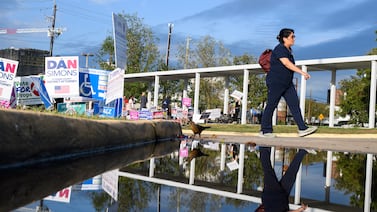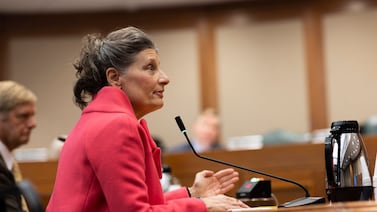Votebeat is a nonprofit news organization reporting on voting access and election administration across the U.S. Sign up for Votebeat Arizona’s free newsletter here.
Around 83,000 longtime Maricopa County residents will get a letter soon telling them that they will lose their eligibility to vote in state and local elections if they don’t provide proof of their citizenship.
The mailing is the response to a state error that is now forcing each Arizona county to ask affected voters to show citizenship proof, which is required under state law for people to vote in state and local elections. For nearly two decades, the state had failed to properly collect this documentation from people when they registered to vote, the Secretary of State’s Office disclosed last summer.
While other counties began sending letters earlier this year to affected voters, Maricopa County chose to wait until after May city elections.
Counties have taken different stances on how to handle eligibility for affected voters who don’t provide citizenship proof, including those who are trying to update their voter record. That has led to disparate treatment of voters across the state, a Votebeat analysis published in April found. Shortly afterward, Secretary of State Adrian Fontes cited Votebeat’s reporting in requesting an opinion from Attorney General Kris Mayes on how to treat voters equally in the future.
With one week to go before early voting begins for the July 15 special primary election for the 7th Congressional District, Mayes has not yet issued her opinion. Six counties with voters in that district will send out mail ballots to eligible voters and open early-voting locations on June 18. But affected voters in some counties may have seen their registration suspended or had their effort to update their registration blocked, which could cause problems for them at the polls.
That shouldn’t be the case in Maricopa County, which hasn’t touched the affected voters’ statuses and doesn’t plan to before the election. But they need to provide proof of citizenship to the Recorder’s Office within 90 days of receiving the letter, or they will be eligible to vote only in federal races.
Notices leave some voters confused
The people affected by the error are residents who obtained their Arizona driver’s license before October 1996, and who registered to vote in Arizona at some point after 2004, including any moves across county lines within the state. The state discovered last year that more than 200,000 voters in this group had been marked as being eligible to vote a full ballot even though they hadn’t been asked for citizenship proof, and it left it to county officials to notify voters, collect the documents, and update their records.
Many voters who received the notices in the past several months didn’t know about the state error. In response to a Votebeat survey, dozens of voters said they were puzzled about why they were suddenly being asked to prove their citizenship.
Many respondents said they had been voting a full ballot for decades and thought the letter was part of Republican efforts nationally to identify noncitizens on the voter rolls, or perhaps an effort to target them personally.
“Seems fishy,” one wrote.
Confused voters have flooded their county recorder’s office phone lines. In Pima County, spokesperson Michael Truelsen said most callers have been kind and appreciative, but “there are a significant number of people who are upset, which is understandable.”
How counties are handling voter eligibility
There’s an added complication for affected voters trying to make sense of the state error: Their eligibility to vote in coming elections — at least for now — depends on which county they live in. This is partly because of a new state law that requires recorders to reject registrations filed on state forms if the voter does not provide proof of citizenship. A few county recorders have interpreted that to apply to people updating their voter record, along with new registrants, causing problems for the voters affected by the state error.
Officials in Maricopa and Pima have said they are not changing the eligibility of the affected voters before the coming congressional primary, so voters should not have any problems at the polls related to the glitch.
Pima County has started sending out notices, but the recorder’s office said it does not believe it has the right under state law to change the voters’ eligibility in these circumstances.
But affected voters in Pinal and Yuma counties might hit obstacles if they don’t prove documentation in time for the 7th District special primary.
Pinal County has already begun suspending registrations of the affected voters who try to update their voter record without providing the documentation. The county is telling the voters it will reactivate their registration once it receives the proof. The county wasn’t able to provide data yet about how many of the affected voters who tried to update their record have had their registration suspended.
In Yuma County, if officials get a request from an affected voter to update their registration, they respond with a letter requesting citizenship proof. If the voter does not receive the letter or respond, their record could remain outdated and they could face problems voting in the special election. About 110 voters have pending updates in the system for this reason, according to the recorder’s office.
The disparate treatment of voters could persist until Mayes’ office delivers its opinion or there’s some other type of resolution.
Voters can check the Secretary of State Office website at my.arizona.vote to see if their registration is active before voting. To find out if they are among the affected voters, they should call their county recorder’s office.
Jen Fifield is a reporter for Votebeat based in Arizona. Contact Jen at jfifield@votebeat.org.



